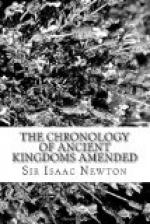The Artificial Chronologers, have made Lycurgus, the legislator, as old as Iphitus, the restorer of the Olympiads; and Iphitus, an hundred and twelve years, older than the first Olympiad: and, to help out the Hypothesis, they have feigned twenty eight Olympiads older than the first Olympiad, wherein Coraebus was victor. But these things were feigned, after the days of Thucydides and Plato: for Socrates died three years after the end of the Peloponnesian war, and Plato [28] introduceth him saying, that the institutions of Lycurgus_ were but of three hundred years standing, or not much more_. And [29] Thucydides, in the reading followed by Stephanus, saith, that the Lacedaemonians_, had from ancient times used good laws, and been free from tyranny; and that from the time that they had used one and the same administration of their commonwealth, to the end of the Peloponnesian war, there were three hundred years and a few more_. Count three hundred years back from the end of the Peloponnesian war, and they will place the Legislature of Lycurgus upon the 19th Olympiad. And, according to Socrates, it might be upon the 22d or 23d. Athenaeus [30] tells us out of ancient authors (Hellanicus, Sosimus and Hieronymus) that Lycurgus the Legislator, was contemporary to Terpander the Musician; and that Terpander was the first man who got the victory in the Carnea, in a solemnity of music instituted in those festivals in the 26th Olympiad. He overcame four times in those Pythic games, and therefore lived at least ’till the 29th Olympiad: and beginning to flourish in the days of Lycurgus, it is not likely that Lycurgus began to flourish, much before the 18th Olympiad. The name of Lycurgus being on the Olympic Disc, Aristotle concluded thence, that Lycurgus was the companion of Iphitus, in restoring the Olympic games: and this argument might be the ground of the opinion of Chronologers, that Lycurgus and Iphitus were contemporary. But Iphitus did not restore all the Olympic games. He [31] restored indeed the Racing in the first Olympiad, Coraebus being victor. In the 14th Olympiad, the double stadium was




